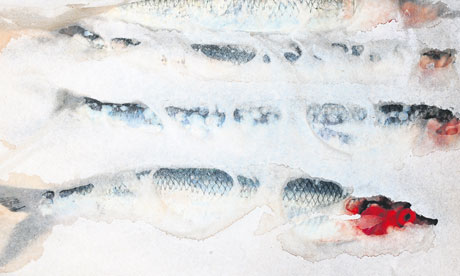
Herring used to be a staple fish in these isles, but it has long since been sidelined by more demure species that are less full-on fishy. That's not the case elsewhere. Scandinavians and Germans are positively obsessed with herring. Same story in Holland, where the silver darling crowds out all else on the fishmonger's slab. Stroll alongside Amsterdam's canals, and you'll catch the distinctive whiff from the city's famous stalls selling snack-size portions of succulent herring with onion pickle – a bargain at €3 a shot.
The upside of Britain's cold-shouldering of this fine species, with its creamy, firm flesh and dependable flavour, is that stocks are relatively buoyant. Don't be wimpy about bones and pungent fish oil. Provided herring is sparkling-fresh and properly filleted, you're in for a treat, whether you eat it fried, chargrilled, baked or even raw.
Why is herring good for me?
Herring is one of the very best food sources of vitamin D. Our bodies make this vitamin in sunlight, but in our climate, it's easy not to get enough. There seems to be more to vitamin D than strong teeth and bones. It's now thought that vitamin D deficiency might be a factor in many diseases, such as multiple sclerosis and diabetes.
Herring is loaded with EPA (eicosapentaenoic acid) and DHA (docosahexaenoic acid). These fatty acids help prevent heart disease and keep the brain functioning properly. They also seem to be effective in reducing inflammatory conditions, such as Crohn's disease and arthritis.
Where to buy and what to pay?
For certainty about freshness and the reassurance of a brisk turnover, put your trust in a traditional fishmonger. Guide price is £8.80 per kilo for fillets.
• Joanna Blythman is the author of What To Eat (Fourth Estate, £9.99). To order a copy for £7.99 with free UK p&p, go to guardianbookshop.co.uk
Pickled herring with rhubarb
This is a great way to preserve herring and handy to have in the fridge when you need a meal in a hurry. Serve with warm new potatoes dressed with a bit of mustard and a little Greek yoghurt or sour cream, accompanied by a green salad, which I dress with some of the pickling liquor and the red onions, plus a drizzle of oil.
Serves 4
8 herring fillets
280ml cider vinegar
200g unrefined sugar
1 tbsp peppercorns (white, black or pink)
2 fresh bay leaves
1 tbsp coriander seeds
2cm fresh horseradish, peeled and quartered
1 red onion, finely sliced
2 sticks of rhubarb, cut in half lengthways if thick, and sliced into 4cm pieces
1 Sprinkle the herring fillets with salt and leave for 2-3 hours. Rinse thoroughly and pat dry.
2 Place the cider vinegar, sugar, peppercorns, bay leaves, coriander seeds and horseradish in a pan and bring to the boil. Add the rhubarb and let it cook very gently for a few minutes. Remove from the heat.
3 Layer the herrings in a non-metallic dish. Place one layer skin-side down on the bottom, then sprinkle over the red onion, and lay the other layer on top skin-side up.
4 When the pickling liquor is warm but not hot, pour it over the fish, making sure they are fully submerged. Leave to cool completely and put in the fridge. They will be ready to eat within 3 days, but will keep for several weeks so long as the fish are submerged.
• Rosie Sykes is head chef of Fitzbillies and co-author of The Kitchen Revolution (Ebury Press, £27.50). To order a copy for £19.99 with free UK p&p, go to guardianbookshop.co.uk

